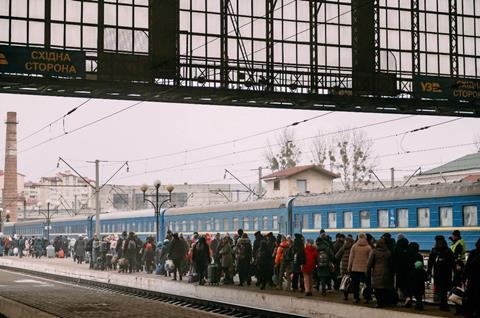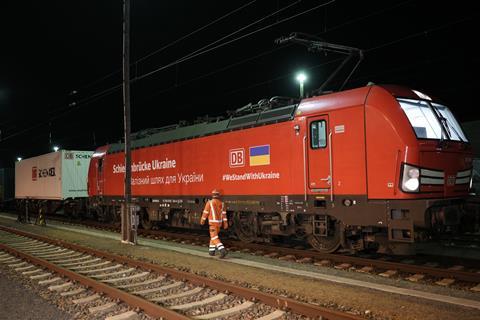
EUROPE: Railways are playing a key role in the flow of refugees out of Ukraine and the supply of aid into the country since it was invaded by Russia, and the Community of European Railway & Infrastructure Companies says it is working closely with its members to track the ‘rapidly evolving’ transport situation.
On March 18 CER said the number of increasingly vulnerable refugees was continuing to rise, posing a risk that border facilities could become saturated, and so it is ‘vital’ to people are helped to reach less crowded reception centres away from frontiers between states.
CER member companies in 23 countries are offering free travel and/or recognising other operators’ free tickets for refugees, and reception zones have been established at stations where railway staff and aid workers can provide information, rest areas and support.
Refugees from the invasion
CER says around 1·9 million refugees had arrived in Poland by March 18, and national railway PKP is on the frontline of humanitarian efforts. By March 14, PKP had received over 150 000 people arriving by train at three of the major border crossings. The busiest border station is Przemyśl Główny, which is now open round the clock and hosting charities and volunteers assisting refugees and offering people in transit rest, showers, warm meals and a bed.
By March 11 PKP had provided more than 425 000 free onward journeys.
Hungary’s MÁV had issued 105 500 free ‘solidarity tickets’ by March 15, Slovakia’s ZSSK had issued around 75 000 free tickets to refugees by March 13, and by March 10 the Czech Republic’s ČD had helped more than 100 000 Ukrainians travel for free.
Germany’s DB had distributed 100 000 free tickets recognised in several countries as of March 13, France’s SNCF estimates that 10 000 free trips had been provided by March 15, Spain’s RENFE had provided over 4 500 free tickets by March 16 and Denmark’s DSB had transported around 1 300 refugees free of charge by March 13.
Aid to Ukraine by rail

Europe’s railways are setting up land bridges to carry aid including medical supplies, food and basic necessities into Ukraine on regular and special services.
Germany’s Deutsche Bahn has set up a rail and road logistics network to transport thousands of tonnes of food, drinking water and sanitary items directly to Ukraine in the coming weeks.
An initial train organised by DB Cargo, DB Cargo Polska, Polish broad gauge operator PKP LHS and Ukrainian Railways departed from Seddin near Berlin on March 11 with 15 containers transporting 350 tonnes of aid including sleeping bags and mats, nappies, canned food, drinking water, warm clothing and baby food, as well as medical supplies.
‘A stable connection and experience in logistics processes are important so that we can help reliably’, said Dr. Sigrid Nikutta, DB management board member for freight.
SNCF Fret is working with SNCF Réseau, wagon leasing company Ermewa and DB Cargo on a humanitarian train that will carry around 500 pallets of relief supplies collected in France.
The Swiss Agency for Development & Co-operation and SBB Cargo have been transporting humanitarian goods to Ukraine in co-operation with PKP, while aid collected in the Czech Republic is being transported to Ukraine using wagons from ČD Cargo.
Co-ordination and solidarity
Stressing that ‘strong co-ordination is key in responding to the crisis’, CER said the European rail community ’remains committed to expressing its solidarity towards Ukraine and its people and will continue supporting the ongoing international aid efforts in close co-operation with local, regional, national and EU-level authorities as well as with fellow rail companies and other transport actors’.

















